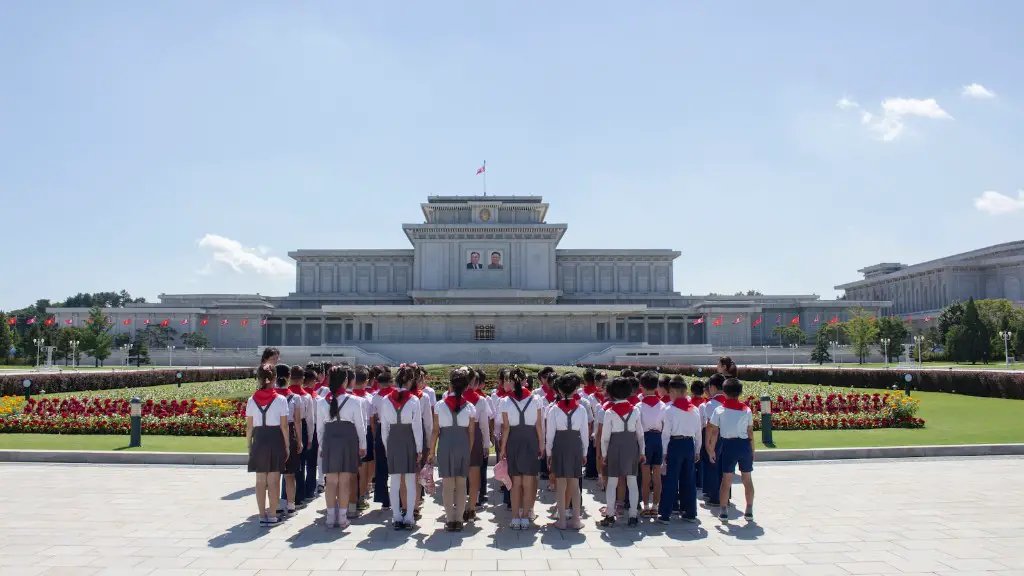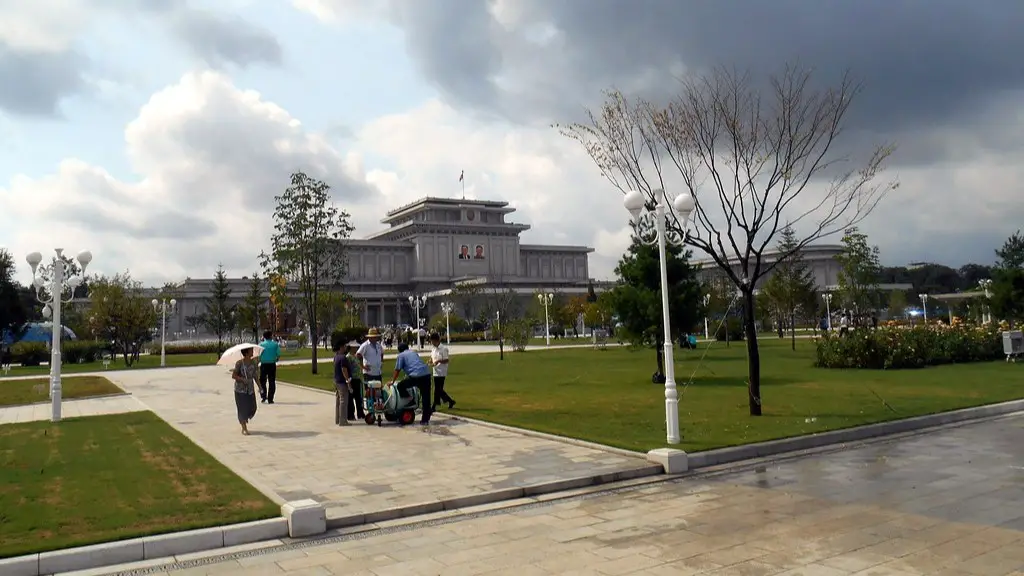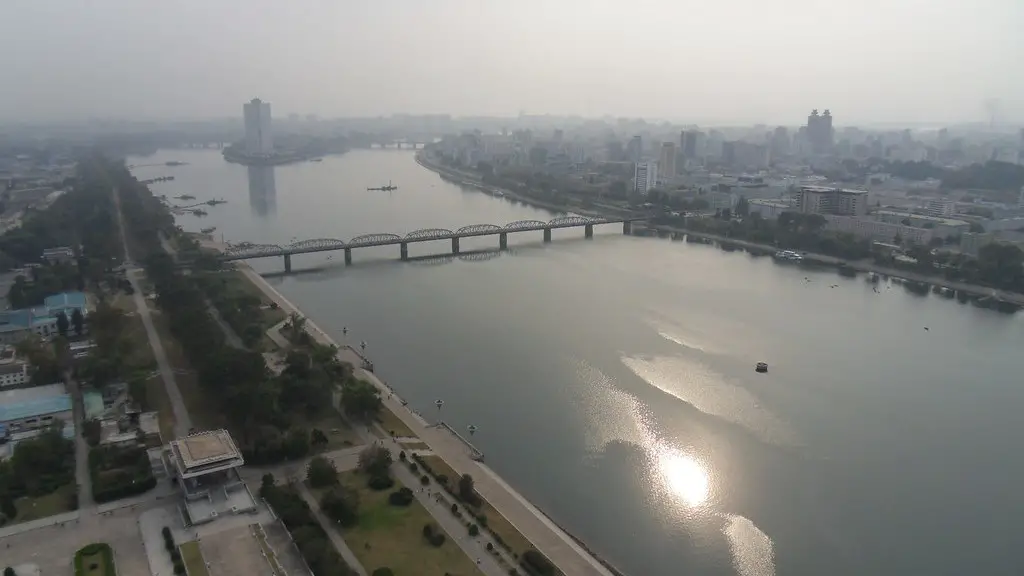North Korea has long been an enigma, and China’s defense of the hermit kingdom has been one of the biggest mysteries of recent times. China has historically been North Korea’s most powerful ally, though their relationship has grown increasingly strained in recent years. But what is the purpose behind China’s unwavering support?
Relationships between China and North Korea have been evolving since the Korean War. China view’s North Korea as a strategic buffer state, shielding it from the influence of capitalist, democratic powers like South Korea and Japan. China also sees North Korea as an economic partner, and an entry point for Chinese companies looking to do business in the region. China holds nearly all of North Korea’s foreign debt – around $5 billion – and many Chinese businesses have operations in the country, giving Beijing a vested interest in propping up the regime.
China’s strategic priorities are also shaping its support of North Korea. Beijing fears that the US could use North Korea as a staging ground to launch military operations in the region, or even directly against China itself. At the same time, China is concerned that a sudden collapse of North Korea’s government could lead to a mass influx of refugees into China, straining its resources and capabilities. As a result, China is seeking to maintain a “soft landing” in the country, allowing it to gradually transition to a more stable, prosperous state while avoiding the violent chaos that would come with an abrupt implosion.
Experts also suggest that China’s reasons for defending North Korea are more moral in nature. Chinese leadership has traditionally held a strong belief in the importance of sovereignty and independence, and sees North Korea’s sovereignty as a way to set an example for other countries in the region. China also views North Korea as a victim of US imperialism, and is concerned that if the US is allowed to actions on the Korean peninsula without consequence, it could embolden the US to intervene in other regions.
In recent years, China has sought to distance itself from North Korea, imposing its own sanctions on the country and attempting to broker diplomatic solutions with the US. Chinese President Xi Jinping’s visit to Pyongyang in June 2018 marked a possible new era of cooperation between the two countries. However, China is still likely to continue its traditional role of defending North Korea, at least to an extent.
International Relations
China’s support of North Korea has also been key to its own rising influence in global politics. Beijing sees its backing of North Korea as both a symbol of its strength and its commitment to defend its interests, whenever and wherever necessary. This has been particularly true in recent years, with China increasingly being perceived as a major power in world affairs, capable of standing up to the US and its allies.
In addition, China has been instrumental in leading negotiations between North Korea and the US. It has acted as a broker and mediator, while also keeping its own interests in mind. As such, Beijing has managed to maintain good relations with both North Korea and the US, a feat that would have been impossible without its enduring engagement in the region.
Geopolitical implications
China’s support of North Korea has long been seen as a major geopolitical issue, with ramifications for the region and beyond. The presence of the country so close to China has been seen as a potential threat by many, particularly those in the US and South Korea. The US has used its influence in the region over the years in an attempt to contain North Korea and limit its power, a strategy that has been met with resistance from China.
China’s protection of North Korea has been a major factor in maintaining the precarious regional balance of power, and has kept the US from acting more aggressively on the peninsula. By standing in the way of US plans for the region, China is attempting to protect its interests, while also working to preserve peace and stability. This has consequences beyond the region, as it serves as a reminder to other countries that China will use its power to defend its interests around the world.
Changing tectonics
China’s relationship with North Korea has been affected by changing international circumstances. As tensions between the US and North Korea have risen, Beijing has been forced to take a more active role, working to de-escalate the situation while still protecting its interests. In recent years, China has also sought to expand its influence beyond the region, becoming increasingly involved in global affairs. This has led to an increasingly complex relationship between Beijing and Pyongyang, one that is characterized both by competition and cooperation.
At the same time, Chinese relations with the United States have been strained, with the two nations locked in a trade war that has had a direct impact on their respective economies. This has further complicated Beijing’s relationship with Pyongyang, as China has had to carefully weigh its own interests with those of its ally.
Economic impact
China’s support of North Korea is also an important economic factor. North Korea’s economy relies heavily on aid from China, and Beijing has been a key provider of food, energy and infrastructure investment to the country. In 2017, Chinese exports to North Korea grew by 37.4%, and Chinese imports from North Korea grew by 8.3%. China’s investment in North Korean infrastructure has increased significantly in recent years, with Chinese companies investing in everything from power plants to roads.
China’s economic clout in North Korea has led to an increase in its political influence. As China has become increasingly involved in the country’s affairs, its role as a protector has grown with it. This is especially true in the effort to deescalate tensions on the Korean peninsula, with China assuming a mediation role between North Korea and the US.
Risks and rewards
The question of why China defends North Korea is complex, and it is clear that both economic and geopolitical factors are at play. While China’s protection of North Korea is seen by some as a source of instability, it has also been important in maintaining the peace in the region. China’s support of North Korea has also been essential in allowing the North Korean economy to develop, and the country’s growing engagement with the world has had a positive impact on the people of North Korea.
In the end, China’s defense of North Korea is a complex mix of strategic, moral and economic interests. It is a balancing act between promoting stability in the region and protecting its own interests, while also allowing North Korea to slowly develop and transition to a more prosperous future.
North Korea’s future
It remains to be seen what the future holds for North Korea, and the role of China in the country’s development. Chinese economic and political influence in North Korea is likely to remain strong, but the role of protector and defender is increasingly tenuous. As regional tensions continue to rise and Kim Jong-un’s grip on power remains uncertain, it is likely that China’s policy toward North Korea will continue to evolve.
It is clear, however, that China will remain an important actor in North Korea’s future. For better or worse, China’s support of North Korea will continue to shape the country’s trajectory – and the region as a whole.
U.S.-China relations
China’s support of North Korea is also an important factor in its relationship with the United States. The US has long been uneasy with China’s role in the region, perceiving its actions as an effort to gain influence and power at the expense of the US. This has led to increasing tensions between the two countries, as the US accuses China of using North Korea to increase its leverage against the US.
At the same time, the US has had to contend with the fact that its own policy of containment and pressure on North Korea is likely only to make China’s support of the country more robust. This has led to a difficult situation, with the US and China locked in a complex geopolitical tug of war.
Diplomacy
The US has sought to use diplomatic avenues to address the issue of China’s support of North Korea. In 2017, US Secretary of State Rex Tillerson visited Beijing to discuss the situation, and held talks with Chinese President Xi Jinping. At the same time, the US has sought to ramp up economic and political pressure on North Korea, seeking to force it to negotiate an end to its nuclear and missile programs.
However, the effectiveness of this strategy has been questioned, with China seemingly unwilling to cooperate. Beijing has rejected US demands that it take stronger action to rein in North Korea, arguing that this would only push Pyongyang further away from negotiations. These differences between the US and China have continued to be a source of tension between the two countries, and have complicated efforts to resolve the situation.
Overall, the question of why China defends North Korea is complex, and not easily answered. There are both strategic and moral considerations at play, and the mix of interests and priorities has made it difficult for both China and the US to balance their respective interests. Ultimately, it is clear that China will continue to play a major role in North Korea’s future, and that its involvement is likely to remain a major source of tensions between the US and China.





